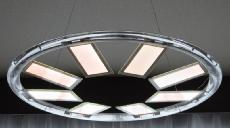Toshiba Corp and Toshiba Lighting & Technology Corp exhibited a see-through OLED lighting panel and an OLED lighting panel supporting wireless power transmission at Lighting Fair 2013, from March 5 to 8, 2013, in Tokyo.

'Window lamp' that does not waste light
In general, see-through OLED panels look transparent when they are off because transparent electrodes are used for both of their positive and negative electrodes. There are many OLED panels that become transparent when they are off. But Toshiba's see-through OLED panel has a different device structure from commonly-used see-through OLED panels and emits most of the light only in one direction.
"While other see-through OLED panels emit 2/3 of the light to the front side and 1/3 of the light to the back side, our panel can emit about 19/20-89/90 of the light in one direction," the company said.
When a large amount of light comes out from the back side of a see-through OLED panel used for a window in a room, etc, it lights up not only the room but also the outside of the room, wasting energy and possibly causing light pollution. The new panel can reduce the amount of light leaked to the outside, making it easy to realize a lighting apparatus that can be used as a transparent window during daylight hours and as a wall light during nighttime hours.
Design of lighting apparatus can be changed by user
The other OLED panel exhibited by Toshiba and Toshiba Lighting & Technology is powered by using an electromagnetic induction-type wireless power transmission technology so that it can be freely moved by the user.
In the past, NEC Lighting Ltd developed an OLED lighting apparatus whose design can be changed by its user. But it is equipped with electrodes used for receiving power. On the other hand, the new panel does not have electrodes, making it easier to change the position of the panel.





 CN
TW
EN
CN
TW
EN






